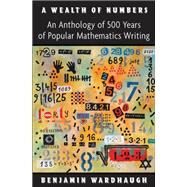A Wealth of Numbers
, by Wardhaugh, Benjamin- ISBN: 9780691147758 | 0691147752
- Cover: Hardcover
- Copyright: 4/9/2012
Despite what we may sometimes imagine, popular mathematics writing didn't begin with Martin Gardner. In fact, it has a rich tradition stretching back hundreds of years. This entertaining and enlightening anthology--the first of its kind--gathers nearly one hundred fascinating selections from the past 500 years of popular math writing, bringing to life a little-known side of math history. Ranging from the late fifteenth to the late twentieth century, and drawing from books, newspapers, magazines, and websites, A Wealth of Numbersincludes recreational, classroom, and work mathematics; mathematical histories and biographies; accounts of higher mathematics; explanations of mathematical instruments; discussions of how math should be taught and learned; reflections on the place of math in the world; and math in fiction and humor. Featuring many tricks, games, problems, and puzzles, as well as much history and trivia, the selections include a sixteenth-century guide to making a horizontal sundial; "Newton for the Ladies" (1739); Leonhard Euler on the idea of velocity (1760); "Mathematical Toys" (1785); a poetic version of the rule of three (1792); "Lotteries and Mountebanks" (1801); Lewis Carroll on the game of logic (1887); "Maps and Mazes" (1892); "Einstein's Real Achievement" (1921); "Riddles in Mathematics" (1945); "New Math for Parents" (1966); and "PC Astronomy" (1997). Organized by thematic chapters, each selection is placed in context by a brief introduction. A unique window into the hidden history of popular mathematics, A Wealth of Numberswill provide many hours of fun and learning to anyone who loves popular mathematics and science.







